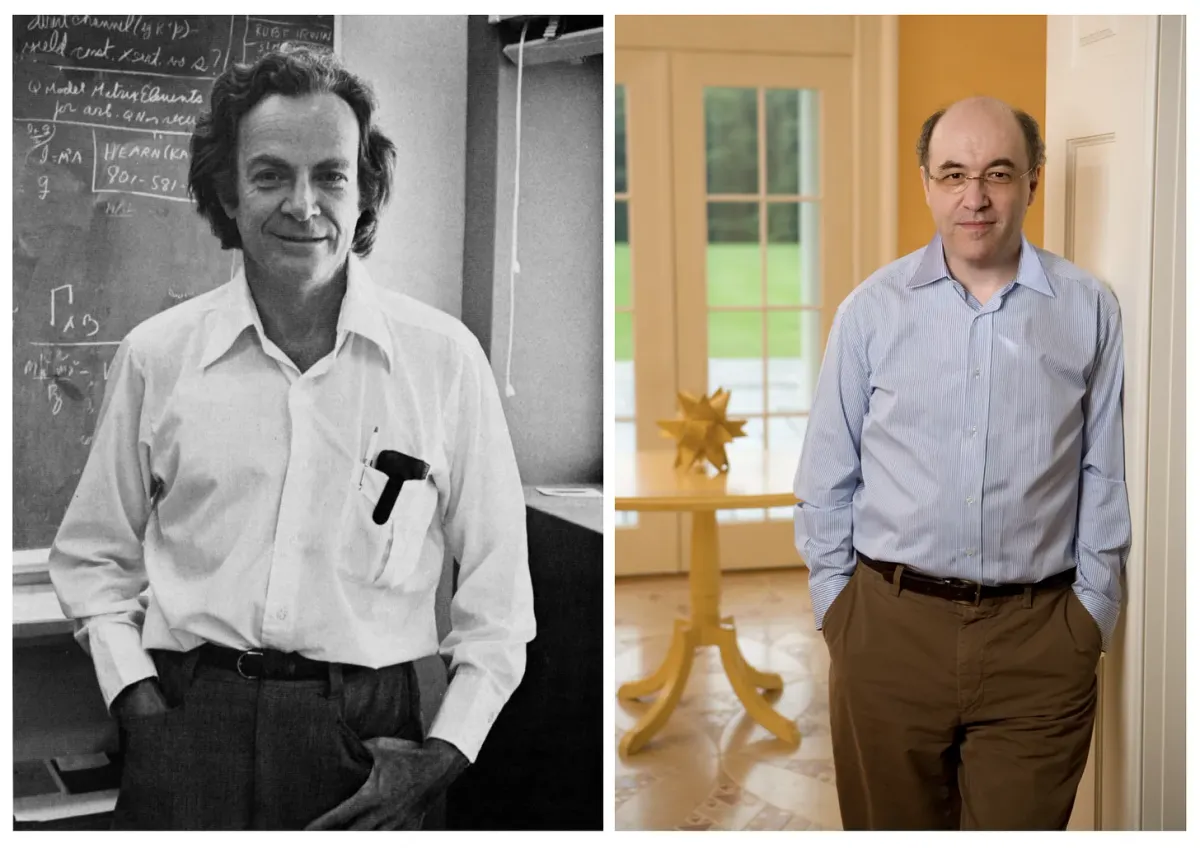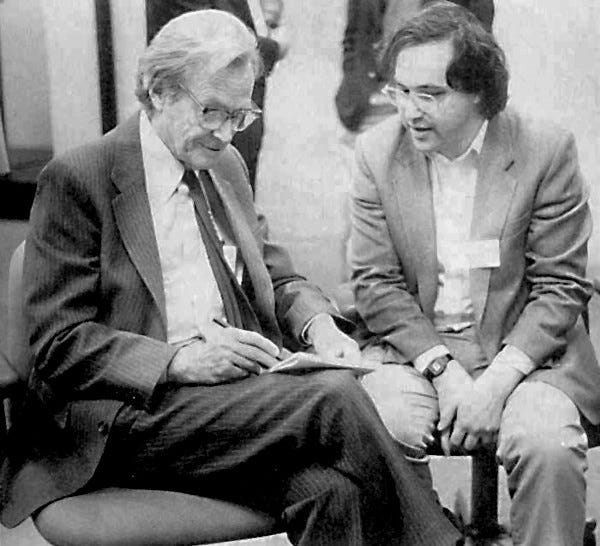Richard Feynman’s Advice to a Young Stephen Wolfram (1985)

«You don’t understand “ordinary people”. To you they are “stupid fools”»
Entrepreneur Stephen Wolfram is a unique egg. By age 14, he had written three books on particle physics. He earned his Ph.D. at age 20 and began publishing research papers at the age of 18, some of which have been cited thousands of times. His software package Mathematica is in its 12th edition. His 1197 page book “A New Kind of Science” was a best-seller, reaching #1 on Amazon when it was published in 2002.
On the 5th of February 2020, the once-boy-genius-turned-software-mogul took to Twitter to announce that he had been “working more intensely than ever … as a result of an unexpected scientific breakthrough I’m hoping to share soon”. Two months later, on April 14th, he posted a blog entry entitled “Finally We May Have a Path to the Fundamental Theory of Physics…and It’s Beautiful”, which starts off on a similarly swaggering note:
“It’s unexpected, surprising — and for me incredibly exciting. To be fair, at some level I’ve been working towards this for nearly 50 years. But it’s just in the last few months that it’s finally come together. And it’s much more wonderful, and beautiful, than I’d ever imagined.”
Wonderful, Beautiful or Boastful?
Wolfram (or, some say, his team of publicists) did his best to turn the bold announcement into a viral sensation. He certainly succeeded, at least judging by the “breathless press coverage” that ensued from the stories written up in Wired, AP Press, Popular Mechanics, Phys.org, Gizmodo, PC Gamer and others. However, as additional details of the supposed breakthrough began to crystallise, an accompanying backlash also emerged.
Steven Levy summarized Wolfram’s initiative in the following, more relatable and down-to-earth way in WIRED Magazine:
“Basically, the project involves creating graph-like models of many possible universes, as defined by rules that determine how the model evolves. As the graphs become more complex — really more complex — they generate phenomena that’s worthy of study in themselves. If the rules are right, one can “discover” in them the real physics that govern our universe — everything from E=mc2 to the law of gravity.”
Revolutionary, right? Well, perhaps not. The seeming response of the physics community may — in my opinion — best be summarized as in the Scientific American article “Physicists Criticize Stephen Wolfram’s Theory of Everything” by Adam Becker where Wolfram’s claims (and accompanying 448 page pre-print paper) are described as “at best, qualitative“. Author Sebine Hossenfelder expressed her frustration over the attention Wolfram’s claims received on Twitter, writing
“I spent two days reading the stuff, trying to make sense of it. I eventually wrote some questions to the Wolfram folks and have since waited for a reply. Why do you think I have to waste my time on some guys’ self-promotion?”
Wolfram — of course — stands firm, claiming that his new model has already replicated “most” of fundamental physics, including “special relativity, general relativity and quantum mechanics”. As such, he invites “the world” to help in his endeavour to discover more, launching a crowdsourcing project entitled “Wolfram Physics Project” where everyone is invited to ”join in” in the “search to decode fundamental physics” using a variety of theories, models and tools prefixed with Wolfram’s surname.
Wolfram’s History of Not Playing Well with Others
As has been pointed out, the fact that complex phenomena (such as the laws of physics) can emerge from seemingly simple models is not at all new. The idea “goes back long before Wolfram”, Daniel Harlow of MIT stated to Scientific American, citing the work of Alan Turing (1912–1954) on computational complexity, John von Neumann (1903–1957) on automata theory and John Conway (1937–2020)’s celebrated “Game of Life”.
However, “Wolfram insists that he was the first to discover that virtually boundless complexity could arise from simple rules in the 1980s”, stating
“John von Neumann, he absolutely didn’t see this, John Conway, same thing.”
Okay.
This (most) recent “outburst” of Wolfram is not his first. Quite the contrary, Wolfram has indeed developed a bit of a reputation for his tendency to periodically emerge to pose grand claims about important problems, which upon further scrutiny appear hand-wavy at best. Of such efforts, Wolfram himself describes not going into such things saying “I’m going to build something bizarrely different that nobody’s going to understand,”
“It just ends up that way.”

Although seemingly unable to work well with the current scientific establishment, Wolfram clearly did manage find a productive atmosphere at Caltech in the late 1970s, where he received his Ph.D. in particle physics in 1979. That was, however, after leaving both Eton College and St. John’s College at Oxford before graduating.
Caltech is where Wolfram first met Richard Feynman (1918–1988), who was on his thesis committee. The next year, he went on to win a MacArthur Fellowship, with a letter of recommendation from Feynman. These and other achievements next brought him to the prestigious Institute for Advanced Study in Princeton. There he remained for about three years, before becoming disenchanted, it appears, with his colleagues. This is when he writes a letter to Feynman, venting his frustrations and asking for guidance.
Wolfram’s Letter to Feynman (September 26th, 1985)
“I am being treated increasingly badly at IAS, and really have to move.”
The relevant part of Wolfram’s letter to Feynman is included below:
Dear Feynman, [...] I thought I would send the enclosed stuff that I have just written. It is not about science (which his what I would prefer to write about), but rather about the organization of science. I am being treated increasingly badly at IAS, and really have to move. I can't see anywhere that would really be nice to go to, and would support the kinds of things I am now interested in. So I am thinking of trying to create my own environment, by starting some kind of institute. It would be so much nicer if such a thing already existed, but it doesn't. There are a few plans afoot to create things perhaps like this, but I think they are rather misguided. You probably think that doing something administrative like this is an awful waste of time, and I am not sure that I can disagree, but I feel that I have little choice, and given that I am going to do it,, I would like to do it as well as possible. Any comments, suggestions, etc., that you might have I would very greatly appreciate. Best wishes, Stephen Wolfram
Feynman’s Letter to Wolfram (October 14th, 1985)
A few weeks later, Feynman responds. Both letters are included in the collection of correspondences of Feynman, entitled “Perfectly Reasonable Deviations from the Beaten Track: The Letters of Richard Feynman” (2005) by Feynman and Ferris:
Dear Wolfram: 1. It is not my opinion that the present organizational structure of science inhibits "complexity research"--I do not believe such an institution is necessary. 2. You say you want to create your own environment--but you will not be doing that: you will create (perhaps!) an environment that you might like to work in--but you will not be working in this environment--you will be administrating it--and the administration environment is not what you seek--is it? You won't enjoy administrating people because you won't succeed in it. You don't understand "ordinary people". To you they are "stupid fools"--so you will not tolerate them or treat their foibles with tolerance or patience--but will drive yourself wild (or they will drive you wild) trying to deal with them in an effective way. Find a way to do you own research with as little contact with non-technical people as possible, with one exception, fall madly in love! That is my advice, my friend. Sincerely, Richard P. Feynman
Eerie, right?
The rest is history. Despite succeeding in publishing strong results in prestigious physics journals starting at age 18, Wolfram left academia in 1987 to found his own research institute, Wolfram Research.
Why Can’t Wolfram Play Well With Others?
“There’s a tradition of scientists approaching senility to come up with grand, improbable theories. Wolfram is unusual in that he’s doing this in his 40s” — Freeman Dyson
The above quote is perhaps excessively poignant, but I simply couldn’t omit it, given the source. Also, there does seem to be some truth to the claims made about Wolfram that he sometimes ventures into grand, solo research projects which tend to ignore a lot of work that has come before him, while simultaneously refusing to play by the rules of science — including peer review. Even the title of his 2002 magnum opus book “A New Kind of Science” poignantly reflects the aspect of Wolfram’s personality that — for some reason — seems to be incompatible with the scientific method and community. Indeed, despite its positive reception from the likes of The New York Times, Newsweek, Wired and The Economists, rather than a “revolutionary new science”, prominent scientists instead criticized the book as “abrasive and arrogant” what with its 1197 pages and lack of a proper bibliography. One review reads:
“The authoritative manner in which A New Kind of Science presents a vast number of examples and arguments has been criticized as leading the reader to believe that each of these ideas was original to Wolfram” — David Dysdale
In particular, Wolfram is criticized for not giving proper credit to his research assistant Matthew Cook(1970-) who proved what many find to be the most substantial technical result presented in the book, namely that the rule 110 cellular automata is Turing complete. Because Cook presented his result at the Santa Fe Institute Conference in 1998, according to Wikipedia, Wolfram later accused him of violating his NDA and blocking the publication of the proof in the conference’s proceedings 🤷🏻♂️🤦🏻♂️.
If one goes digging, one does not have to dig very deep before similar stories and critiques of Wolfram are found. In the essay “Stephen Wolfram’s Unfortunate Ego” by Ned Batchelder, he notes that “Much has already been said about Wolfram’s high opinion of himself, and his presentation style. Even knowing these things beforehand, my breath was taken away by the sheer size of Wolfram’s ego.” Cosma Shalizi (who worked on cellular automata) entitled his review of Wolfram’s book “A Rare Blend of Monster Raving Egomania and Utter Batshit Insanity” and in it noted that “Lawyers for Wolfram Research Inc. threatened to sue me, my co-authors and our employer, because one of our citations referred to a certain mathematical proof, and they claimed the existence of this proof was a trade secret of Wolfram Research”.
Bizarrely, when the predicted Higgs boson was found at CERN in 2012, Wolfram took to The Atlantic to complain to the celebratory scientific community that the discovery was actually “disappointing”, in the hilariously titled article “Why the Higgs Boson Discovery is Disappointing, According to the Smartest Man in the World” by Alexis C. Madrigal.
Epilogue
In fairness, I also want to include a more productive perspective, for which I owe credit to user teejermiester on Reddit:
Wolfram claims that he wants respect from physicists, but refuses to use the tools and structure that allows physicists to understand new works and properly give credit to those that deserve it. He also refuses to respect the scientists whose work builds a foundation for his own.
These actions will undoubtedly make Wolfram's new theory much less widespread than it could otherwise be. What physicist can take the time to read a 400 page manuscript that hasn't been peer reviewed and may or may not actually contribute to their field?
“I feel that Wolfram is shooting himself in the foot here, which is unfortunate because I find his recent work fascinating regardless of whether or not it’s the theory of everything.”
That would be the mature take, which I don’t think many people — including me — would disagree with. In this vein, I would be remiss if I didn’t also include Feynman’s letter of recommendation for Wolfram, which certainly speaks kindly of his abilities, albeit nearly 40 years ago:
Dear Dr. Freund, Looking for something else I found this unfinished recommendation for Stephen Wolfram in a drawer. I did not consciously remember it when the Zweig request came. I see now my desire to revolt against writing these recommendations has an unconscious basis in previous experience. Anyway, for what it is worth I am having my secretary type the Wolfram recommendation and send it to you in the unfinished state I left it. You asked for information about Stephen Wolfram in connection with the MacArthur Foundation Prize Fellow Award. Dr. Wolfram has the truly exceptional qualities you are seeking for your award. He has worked energetically and creatively in many fields. Examples of his creative originality are many. For example, he invented an ingenious way to make comparison of high-energy experiments to incomplete theoretical predictions of quantum chromodynamics. As another example he has designed and programmed a new system for computer algebraic and symbolic manipulation starting from scratch and in an entirely original and independent manner. His analysis of baryon production in the early universe pointed out significant errors in the work that came before him. He has made himself fully aware of all the problems in theoretical physics, from gravitation, cosmology and the new unified field theories, to the detailed problems of hadron physics and the weak interactions. The method he uses in studying each question is not so much to read about it, but to work it all out himself. He works very hard. Such methods and such industry is, of course, the true source of creativity and originality. There is not a seminar here that proceeds without an important comment, question, or criticism by Wolfram. I don't know of any others in this field that have the wide range of understanding of Dr. Wolfram. He seems to have worked on everything and has some original or careful judgement on any topic. Sincerely, Richard P. Feynman





